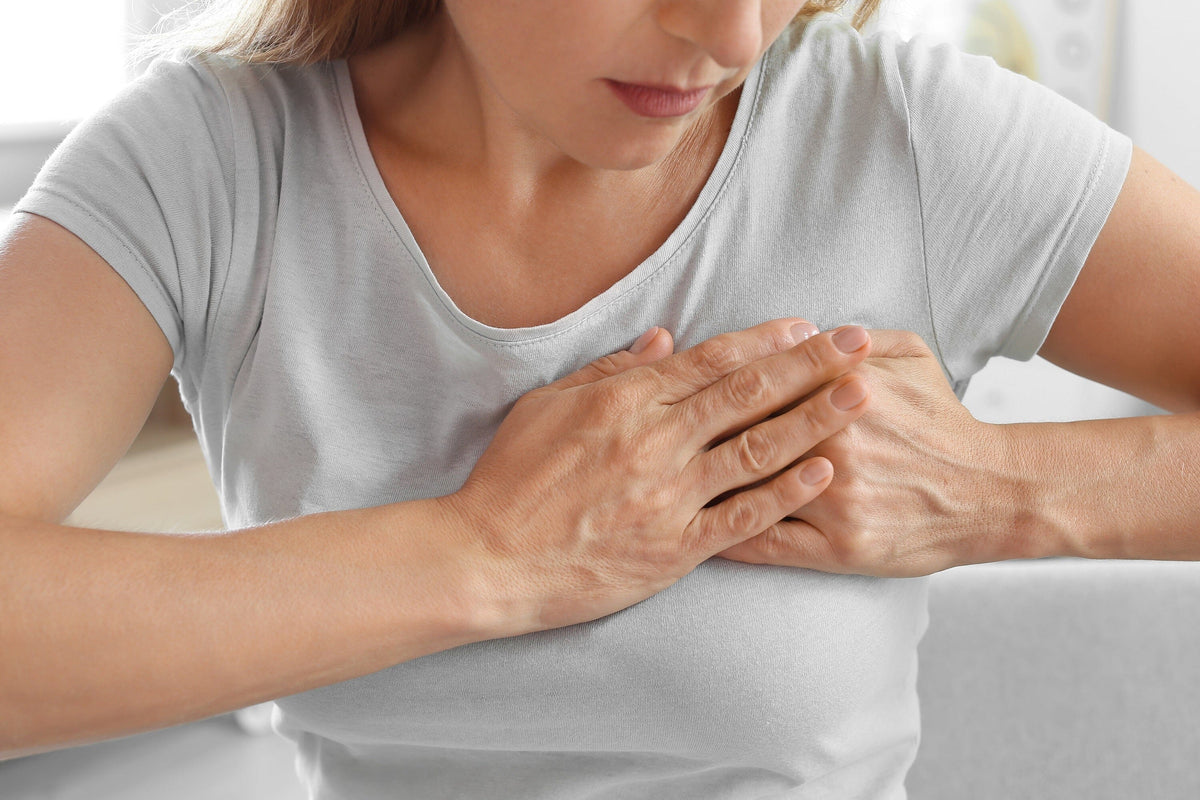Perimenopause breast pain might not be the most well-known symptom, but it's one of the more common. Up to 70% of women will experience breast pain in their lifetime, with those in their 30s and 40s most likely to be affected.1 And in many of these cases, the breast discomfort experienced can be tied to hormone fluctuations, which become even more common during perimenopause and menopause.
While the symptoms of sore breasts or breast tenderness during menopause can be uncomfortable, they’re not usually a cause for concern. What's more, lifestyle changes and home remedies can often be effective in managing breast pain after menopause.
Here's what you should know about perimenopause breast pain, the best ways to ease breast pain, and when to bring the problem of sore breasts during menopause up with your healthcare provider.
Does Perimenopause Cause Breast Pain?
Breast pain, or what experts call mastalgia, is often the result of normal hormone fluctuations that occur during a woman's menstrual cycle. This type of breast pain is called cyclic breast pain.
Cyclic breast pain is most commonly associated with fluctuating hormonal levels experienced during menstruation and often causes discomfort, tenderness, or swelling in both breasts in the week leading up to your period. These symptoms become more noticeable during perimenopause as hormones begin to spike more erratically.2 Sometimes these symptoms can persist into menopause, especially in women who are taking birth control pills or hormone replacement therapy to help manage other menopause symptoms.3
Breast pain in menopause and perimenopause isn't always related to hormones and menstruation, though. Noncyclic breast pain doesn't follow a typical monthly pattern and is more likely to occur after menopause. Some of the most common culprits include ill-fitting bras, benign cysts, infected milk ducts or ingrown hairs, an injury to the ribcage or breastbone, or chest pain caused by angina.4 Having larger breasts or undergoing breast surgery can also increase the risk for noncyclic breast pain in menopause.5
Noncyclic Breast Soreness Versus Cyclic Breast Soreness in Menopause
If you're wondering whether cyclic and noncyclic menopause breast pain feel any different from each other, the answer is yes. In fact, it's often fairly easy to tell whether your mastalgia is related to perimenopause PMS symptoms or caused by something different.
Cyclic, PMS-related perimenopause breast pain tends to: 6
- Happen leading up to and during perimenopause
- Occur a week or so before your period, then goes away
- Cause breasts to feel tender, swollen, heavy, or sore
- Cause breasts to have a "lumpy" texture
- Affect both breasts at the same time
Noncyclic sore breasts in perimenopause tend to: 7
- Be more likely to happen after menopause
- Occur at any time, not related to a period
- Feel tight, or like burning, stabbing, or aching
- Come and go
- Affect one breast in a specific area
Managing Perimenopause Breast Pain
Perimenopause and menopause breast pain is often easy to manage through simple lifestyle modifications. That said, some remedies may be more effective for one type of mastalgia than another. So, it's worth determining whether your discomfort is hormone-related before trying to address it. Here are some ways that may help to alleviate aching breasts during menopause or perimenopause:
- Support your breasts with a well-fitting bra. The right bra will provide more support and keep your breasts from uncomfortable bouncing or swinging, especially during physical activity. If it's been a while since your last bra fitting, consider getting re-measured: It's normal for breast shape and size to shift over time.8
- Try hot or cold compresses. Both can be soothing for breast soreness, especially when used before bed.9
- Manage your stress. Some research suggests that feelings of anxiety or depression could contribute to menopause breast pain.10
- Eat a healthy diet. The research on nutrition and breast pain is mixed, however, some findings suggest that eliminating caffeine and eating a nutritious, fiber-rich diet may be beneficial.11
- Be active. Exercise can slow the body's release of estrogen and speed up its breakdown, which could be helpful for women with cyclic breast pain in perimenopause.12
- Consider a supplement. Magnesium, vitamin E, and evening primrose oil could be helpful for managing cyclic breast pain as well as other perimenopause PMS symptoms.13
- Ask your healthcare provider about a pain reliever. Over-the-counter (OTC) drugs like acetaminophen, ibuprofen, and naproxen can all be effective when lifestyle changes aren’t enough for dealing with sore breasts in menopause. Applying an OTC cream, such as trolamine salicylate to your breasts, is another good option.14
Is Perimenopause Breast Pain Ever a Cause for Concern?
Breast pain can be unnerving, especially if it's something you don't usually experience. However, most cases of mastalgia - even those that happen after menopause or don't seem to be linked to your period - are benign, and cancer is not usually the cause of a woman's breast pain.15
It's still important to have new or changing breast pain in menopause examined though. If you have new or unusual breast pain that sticks around for two or more periods, experience sore breasts after menopause, or notice that your breast pain doesn't seem to be related to a period, see your healthcare provider.16 Together you can figure out the cause of your discomfort and determine the best plan for managing or getting rid of the pain – you can also work together to ensure you stay up to date with your mammogram screenings to maintain overall your breast health.
Resources
- https://my.clevelandclinic.org/health/diseases/15469-breast-pain-mastalgia
- https://www.breastcancer.org/symptoms/benign/mastalgia
- https://www.health.harvard.edu/pain/breast-pain-not-just-a-premenopausal-complaint
- https://www.ncbi.nlm.nih.gov/books/NBK562195/
- https://www.mayoclinic.org/diseases-conditions/breast-pain/symptoms-causes/syc-20350423
- https://www.mayoclinic.org/diseases-conditions/breast-pain/symptoms-causes/syc-20350423
- https://www.mayoclinic.org/diseases-conditions/breast-pain/symptoms-causes/syc-20350423
- https://my.clevelandclinic.org/health/diseases/15469-breast-pain-mastalgia
- https://www.ncbi.nlm.nih.gov/books/NBK562195/
- https://www.ncbi.nlm.nih.gov/books/NBK562195/
- https://www.ncbi.nlm.nih.gov/books/NBK562195/
- https://www.ncbi.nlm.nih.gov/books/NBK562195/
- https://www.ncbi.nlm.nih.gov/books/NBK562195/
- https://my.clevelandclinic.org/health/diseases/15469-breast-pain-mastalgia
- https://www.ncbi.nlm.nih.gov/pmc/articles/PMC4960349/
- https://www.mayoclinic.org/diseases-conditions/breast-pain/symptoms-causes/syc-20350423









Comments
Post commentI so appreciate that this subject was so nicely discussed. It’s something women don’t talk about enough.